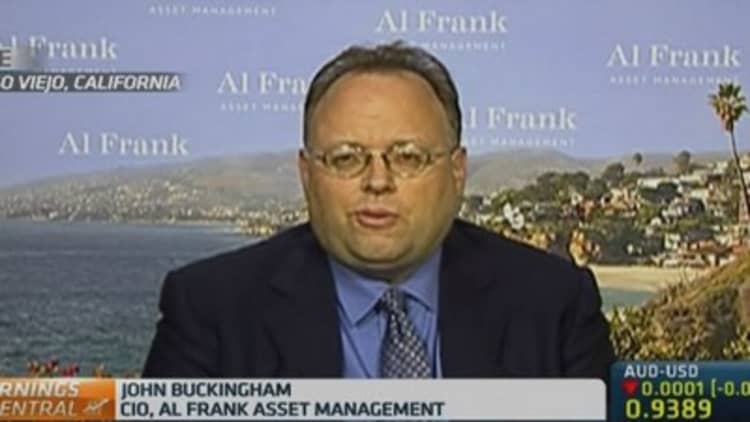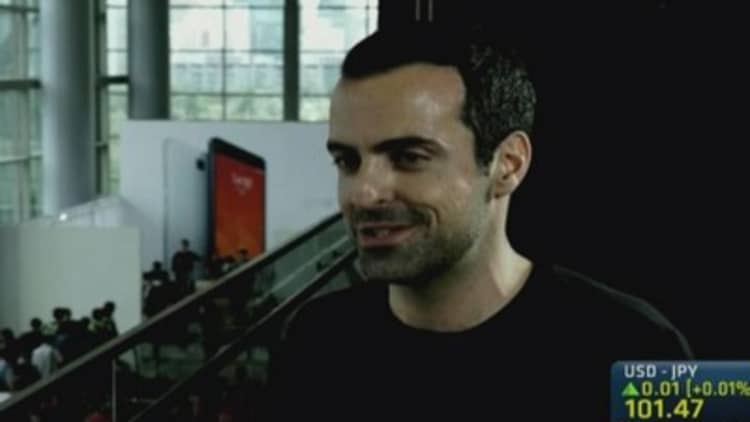In a fairly muted earnings release, by its own standards, California-based Apple delivered a mixed set of results on Tuesday that underlined a shift in fortunes for the technology giant. In years gone by, the group had been plagued by concerns that it might fail to find any success in emerging markets.
But Apple delivered a chest-beating rise in year-on-year sales of 28 percent in Greater China on Tuesday. Meanwhile, it saw flat sales growth in its home markets which were still seeing double digit expansion at the start of the decade. In addition, tablet sales look to be losing their shine with iPad revenue falling 23 percent from the previous quarter.
(Click here to get the latest quotes for AAPL.)
Antoine Chemali, the CIO at Digital World Capital called the results "a little mixed", while John Buckingham, the CIO at Al Frank Asset Management said the quarter was a little "ho-hum" for Apple.
What's clear is that a deal back in January to sell iPhones on China Mobile's vast network is proving fruitful. CEO Tim Cook called it a "watershed" moment at the time, and with the Chinese company currently deploying the advanced 4G mobile telecommunications technology, analysts believe there could be more upside down the line. Gene Munster from Piper Jaffray told CNBC Tuesday that Apple would have some "easy room to grow" and it was still just "scratching the surface" in this sizeable and important market.
Read MoreApple profit beats estimates, revenue short
China now generates 61 percent of the absolute increase in year-on-year revenues for Apple, analysts at Nomura noted in new research after the earnings release. The investment bank raised its target price on Apple to $95 from $88.71 with the stock closing at $94.72 on Tuesday. RBC also raised its target price on Wednesday morning, to $110 from $100, with similar moves coming from analysts at Macquarie and Cowen and Company.

But while the bulls took delight in the foothold it has created for itself in China, not to mention the impending release of its iPhone 6, there were still bears foreseeing stagnation and more contraction in its gross margins.
Tablet sales were particularly disappointing for many analysts. Ian Dogan, a research director & co-founder at Insider Monkey, believes Apple's products and typical markets are maturing, adding that the drop in iPad sales is not something investors should ignore.
"We don't think the margins are sustainable, eventually those margins are going to go down and that's when we're going to see Apple go to $50 or $40," he told CNBC Wednesday.
Read MoreFacebook earnings:Here's what to expect
Xiaomi coming to the US?
There's also the potential for competition from Chinese firm Xiaomi, whose own CEO Lei Jun claims his company's new Android-based offering is "really better than the iPhone." Xiaomi is often referred to as China's answer to Apple but the firm still considers itself to be a startup with a lifespan that only reaches back four years.

Hugo Barra, the vice president for global operations at Xiaomi, told CNBC Wednesday that the smartphone maker is firmly focused on key emerging markets. After finding success in its home market it has launched in India, with Latin America and Indonesia currently near-term goals.
Barra said that these are very large markets that have huge demand with many people experiencing smartphones for the first time. Xiaomi became a top three smartphone vendor in China for the first time this year, according to research firm Canalys, and is now sixth in terms of global market share.
Apple analysts find bright spots in mixed quarter
Xiaomi isn't scared of Apple's home markets either it seems, despite the softness seen in Tuesday's figures. Barra told CNBC that Xiaomi wasn't ruling out a move into the U.S. market in the longer term.
"Someday, we don't know when, we're going to work to that day...there's a lot of work to happen before we are ready for a market as large and as competitive as the United States," he said.


